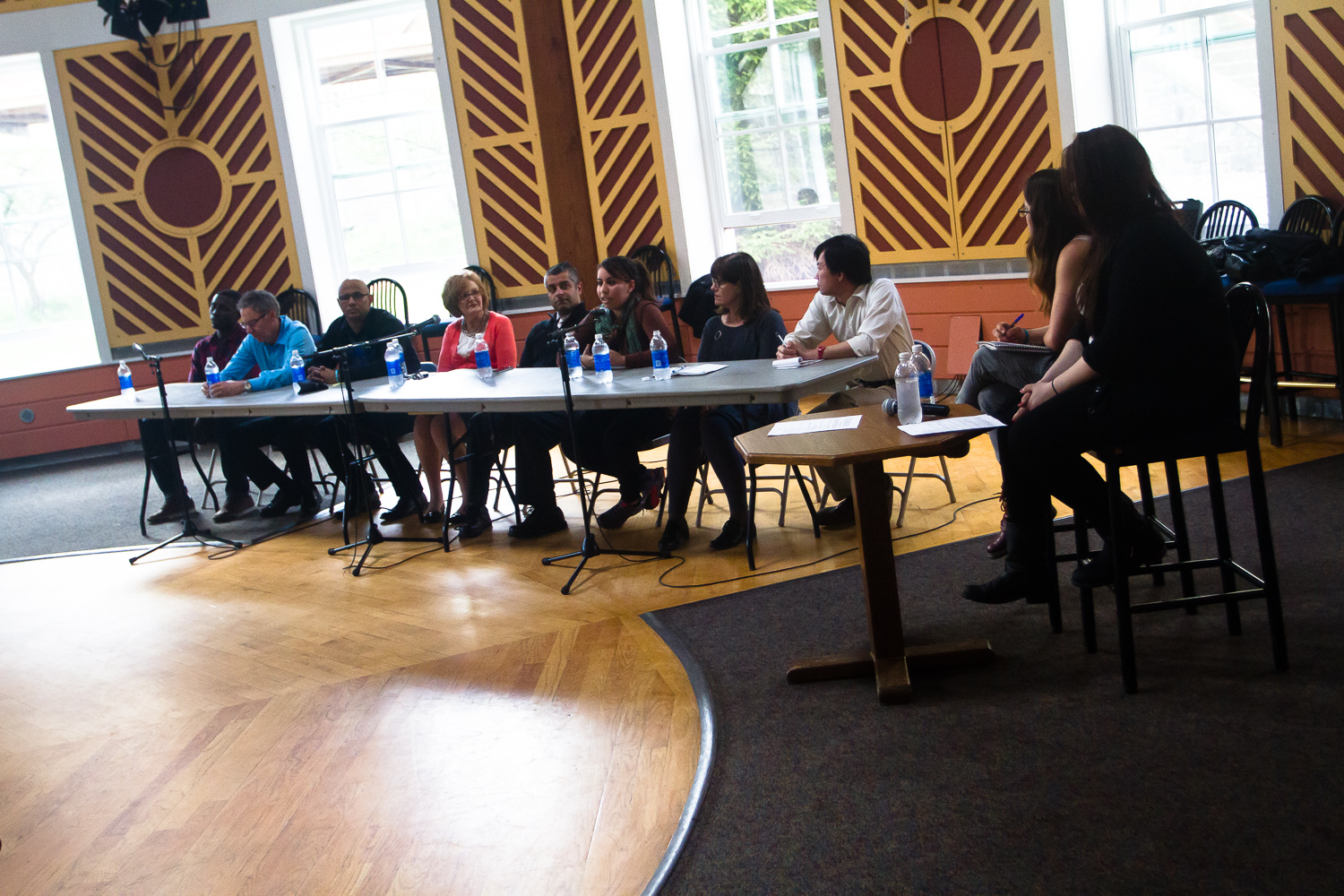
In a country as vast and multicultural as the United States, it’s difficult to pin down what exactly constitutes an American identity. Do self-indentifying “Americans” have specific traits that they all hold in common, and if not, what unites them under the red, white and blue flag? A panel of Hamilton community members discussed this complex question during the panel “What Does It Mean to Be American?” presented by La Vanguardia.
The panelists came from diverse backgrounds representing North and South America, Europe, Asia and Africa, ensuring that each individual would bring a unique set of experiences to the table. The hosts were Gretha Suarez ’15 and Carol Antunez ’15. Panelists included Ming-De Xu, East Asian Languages & Literatures (Chinese); Juana Sabadell-Nieto, Hispanic studies, Nigel Westmaas, Africana Studies; Alan Cafruny, the Henry Platt Bristol Professor of International Affairs; Amit Taneja, director of the Days-Massolo Center; Janet Turvey, assistant to the chief diversity officer; Fidaa Abuassi, Fulbright FLTA Fellow; and Sadiq Abubakar ’15.
No panelist identified him or herself as fully American. Rather, each spoke to their experiences with American people, and the extent to which they felt they had adopted the U.S. culture. Cafruny, the only “natural born U.S. citizen” on the panel expressed discomfort with the idea of nationalism as it relates to any country and prefers to represent himself as a global citizen.
Other panelists, such as Turvey and Taneja, reported mixed feelings about their time in the States. Turvey immigrated to the United States in 1985 from the U.K. She explains that she often felt homesick after her move because she felt misunderstood in the context of American culture, both in terms of the language and because of differing conventions. Taneja originally hails from India but moved to Canada for his undergraduate studies and then the U.S. for his master’s degree. He explained that he has also felt lonely and alienated in the states, citing a feeling of underrepresentation in the media as one possible cause.
Conversely, many panelists feel that, even if the U.S. is not entirely their home, simply spending time in this country has helped shape their identity relative to their native country. For example, Xu says that when he is in the states, he is often asked where he is from, which has led him to ask complex questions about his home in Taiwan and how that country’s identity relates to China’s. Abubakar feels that when he returns to Nigeria, he cannot quite relate to his home country in the same way as before he left.
Many panelists, including Westmaas, described the United States as a “global culture” in the sense that American media reaches even the farthest corners of the earth. For many, including Taneja and Abubakar, this meant that America represented an idealized land of plenty. Upon arriving in this country, both experienced a somewhat harsher and less idyllic reality.
Abubakar expressed three main concerns with American culture as he has experienced it. He was expecting to come to a country that could be summed up by what he had seen in the media. On the contrary, he believes that the media supports a certain level of ignorance about other countries. Second, a lot of people have addressed him from a very America-centric viewpoint --that they believe that all things American are inherently better. Finally, he was surprised by the prejudices and double-standards that he witnessed against minorities. Taneja had a different but relevant experience in that he came to the States shortly after 9/11 and was the victim of unrelenting racial profiling.
Westmaas added to this discussion by sharing his memories from graduate school at Binghamton University. As an immigrant from Guyana, he also felt discriminated against in more subtle but equally unjust ways. Westmaas recalled that he and his friends were often followed through stores because security personnel did not trust them, and they were even arrested for playing cricket on Binghamton’s baseball field.
Abuassi, on the other hand, came to the United States from Gaza on a Fulbright scholarship with much less rosy expectations than several other panelists. Her family had warned her not to reveal that she was a Palestinian Muslim for fear that Americans, who are stereotyped as “Israel’s best friend,” would reject her. Though it has taken Abuassi some time to open up to U.S. citizens, she has actually found Americans to be much more accepting and willing to listen to her than she had anticipated. Abuassi’s story demonstrates the mixture of positive and negative experiences that panelists discussed.
Perhaps the most enlightening takeaway point from the panel was that these is no right or wrong way to be an American, and each individual’s experiences in this country are equally valid. The panel offered a perfect venue for open-ended, meaningful discussion, spanning five continents, more than 20 years and, most importantly, quite diverse personal narratives.
Posted May 1, 2013
